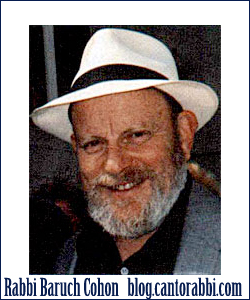A GREAT SABBATH – Shabat hagadol – by Rabbi Baruch Cohon
This week, most synagogue Torah services include a special reading from the Prophets – not the regular Haftorah but one designated for the Sabbath before Passover, called Shabat hagadol, the Great Sabbath. It comes from the third chapter of Malachi, last of the Biblical prophets. Try some of his statements on for size:
“Your words are strong against Me, says G-d. You say it is vain to serve G-d. What benefit did we get from keeping His charge, and walking mournfully because of the Lord of Hosts?… Those who work mischief are built up. They challenge G-d and get away with it.”
Sounds pretty contemporary?
Well, Malachi lived some 2500 years ago, in the days of the Second Temple. He saw a generation becoming what we would call secular. The Hertz commentary points out that Israel was beginning “to doubt whether there was a righteous Governor of the universe, and was losing Israel’s belief in Israel.” So not only were the people losing faith in G-d, they were also losing faith in themselves as a nation. Malachi countered that condition with a message of justice and hope. We do well to read his message today.
Speaking for G-d, he says: “I will come near to you for judgment. I will be a swift witness against the sorcerers and the adulterers and the perjurers, and against those who cheat the laborer out of his pay, and those who oppress widows and orphans and turn the stranger away.” In other words, religion is more than an individual opinion; it is a way to correct our wrongs. A thoughtful message at any time.
The last sentences of this Haftorah bring us its connection with the coming holiday: “Behold, I will send you Elijah the Prophet before the coming of the great and awesome Day of G-d. And he will turn the hearts of parents to their children, and the hearts of children to their parents, lest I come and strike the land with utter destruction.” No more generational conflict.
It will be Elijah – Eliyahu haNavi – who will appear to announce the Messiah. We know that Elijah, one of the first Prophets, was not depicted dying a natural death. He was swept up into a fiery heavenly chariot as his disciple Elisha looked on. That is how his exit is described in Second Kings chapter 2. Ever since then, Jewish lore has held out the hope that the great prophet will some day return to earth and bring on the Messianic Age. We dramatize that hope at every Seder meal when we keep a full goblet of wine on the table for Elijah’s cup, and open the door at a designated point in the evening to receive him. And of course we sing to him… and doesn’t it seem like the wine in that cup is now a little less than full?
One of these years….


